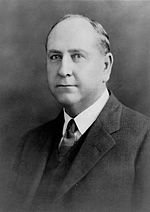Phillip Collier
|
The Honourable Philip Collier |
|
|---|---|
 |
|
| 14th Premier of Western Australia | |
|
In office 17 April 1924 – 23 April 1930 |
|
| Governor |
Francis Newdegate William Campion |
| Preceded by | James Mitchell |
| Succeeded by | James Mitchell |
|
In office 24 April 1933 – 19 August 1936 |
|
| Governor | none |
| Preceded by | James Mitchell |
| Succeeded by | John Willcock |
| Leader of the Labor Party in Western Australia |
|
|
In office 16 April 1917 – 16 August 1936 |
|
| Preceded by | John Scaddan |
| Succeeded by | John Willcock |
| Member of the Legislative Assembly of Western Australia |
|
|
In office 27 October 1905 – 18 October 1948 |
|
| Preceded by | John Hopkins |
| Succeeded by | Charlie Oliver |
| Constituency | Boulder |
| Personal details | |
| Born |
21 April 1873 , Victoria, Australia |
| Died | 18 October 1948 (aged 75) Mount Lawley, Western Australia, Australia |
| Political party | Labor |
Philip Collier (21 April 1873 – 18 October 1948) was an Australian politician who served as the 14th Premier of Western Australia from 1924 to 1930 and from 1933 to 1936. He was leader of the Labor Party from 1917 to 1936, and is Western Australia's longest-serving premier from that party.
Collier was born in Victoria and came to Western Australia to work in the mines. He became involved in the union movement on the Eastern Goldfields, and entered parliament at the 1905 state election, winning the seat of Boulder (which he would retain for the rest of his life). In 1911, Collier became a minister in the government of John Scaddan. He replaced Scaddan as Labor leader in 1917, in the aftermath of the split over conscription, and became premier when Labor recorded a narrow victory at the 1924 state election. Collier's government was defeated at the 1930 election, but he returned as premier after a Labor landslide in 1933, serving until his retirement in 1936
As premier, Collier enjoyed a stability that had been absent from previous Labor administrations in Western Australia. His government was on good terms with trade unions, and its improvements to industrial arbitration laws have been credited with reducing the number of industrial disputes relative to other states. It also had various workers' rights enshrined in legislation, including a basic wage and a 40-hour week. Collier himself was a political moderate, and borrowed policies from his predecessors in certain areas, notably rural development. Later writers have praised his statesmanship and his skilled handling of his opponents, both inside and outside of his party.
...
Wikipedia
